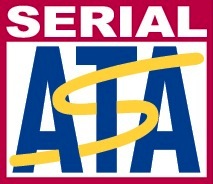 The Serial ATA International Organization (SATA-IO) announced its new µSSD standard for embedded Solid-State Drives (SSDs).
The Serial ATA International Organization (SATA-IO) announced its new µSSD standard for embedded Solid-State Drives (SSDs).
For more information visit: www.sata-io.org
Unedited press release follows:
SATA-IO Introduces New Standard for Embedded SSDs
µSSD Specification Eliminates Connector for Easy Integration in Embedded Devices
BEAVERTON, Ore.–The Serial ATA International Organization (SATA-IO), the consortium dedicated to sustaining the quality, integrity and dissemination of serial ATA (SATA™) technology, today announced a new standard for embedded solid state drives (SSDs). The SATA µSSD™ specification eliminates the module connector from the traditional SATA Interface, enabling developers to produce a single-chip SATA implementation for embedded storage applications.
The µSSD standard offers a high-performance, low-cost, embedded storage solution for mobile computing platforms like ultra-thin laptops. The specification defines a new electrical pin-out that allows SATA to be delivered using a single ball grid array (BGA) package. The BGA package sits directly on the motherboard, supporting the SATA interface without a connecting module. By eliminating the connector the µSSD standard enables the physically smallest SATA implementation to date, making it an ideal solution for embedding storage in small form factor devices.
“As tablets and other small computing devices continue to proliferate in the market, the need for scalable small form factor storage solutions rises exponentially,” said Mladen Luksic, SATA-IO president. “µSSD provides a new way to leverage the speed, reliability, and low power requirements of SATA technology in these types of products to enable powerful new computing platforms.”
SATA-IO is also developing interoperability tests for µSSD products that will help ensure devices based on the µSSD standard will be compatible with other µSSD-based products. Products based on the µSSD specification are already available from SanDisk Corporation. Samsung and Toshiba have also expressed support for the standard.
The µSSD specification was developed as part of SATA-IO’s continued mission to provide low-cost, high performance storage solutions optimized for a variety of device segments. Since its introduction in 2001, SATA technology has evolved to enable storage options for a number of applications beyond traditional hard disk PC storage. SATA is now implemented in a variety of applications including solid state and optical drives, embedded mobile devices, consumer electronics products and enterprise storage.
SATA specifications are available for members to download at no cost. Non-members may purchase the specification for a nominal fee. Click here for more information on accessing the specifications.
Industry Support for µSSD
Flash industry leaders are supportive of the µSSD initiative. SanDisk currently utilizes the new specification in its iSSD™ integrated storage device, the world’s smallest, fastest 128GB (SATA 6 G/bs) SSD, and other companies are making plans to follow suit.
“The SATA µSSD™ standard is a significant industry achievement that brings high-performance SSD storage in a BGA form factor,” said Kevin Conley, senior vice president, client storage solutions, SanDisk. “This is enabling OEM designs of new super-thin Ultrabooks and tablets with high SATA performance.”
“The µSSD specification will enable embedded storage applications to give designers greater design flexibility,” said Scott Nelson, VP Memory Toshiba America Electronic Components, Inc. “Toshiba is pleased to support the development of this specification, which will help enable the continued evolution of thinner and smaller personal computing devices.”
About SATA-IO
Formed in September 2004, SATA-IO is the International Organization that owns and manages Serial ATA specifications as open industry standards. The organization defines and implements the Serial ATA specifications as the industry’s storage needs evolve. It is dedicated to sustaining the quality, integrity and dissemination of SATA technology by maintaining the specifications, promoting and marketing the benefits of the technology and creating future interface features and specifications that carry storage into the next decade. Additional information about the organization, its participating companies and membership is available at www.sata-io.org.